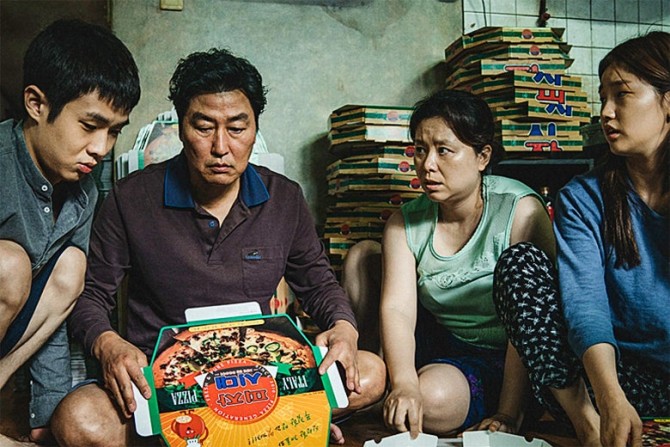Parasite is the best Korean film ever!!! And yes, I’ve seen Oldboy.
Genre: Drama/Thriller
Premise: A poor family slowly and methodically infiltrates a rich family’s home by taking all of the help jobs.
About: Even though Parasite had a 99% RT score, I was still skeptical. I mean how much can we really trust a website that gives Black Panther a 97% score? But the reviews coming out of Parasite seemed to have some extra bite to them. They weren’t the usual hyperbole-laden suspects attempting to get quoted in the movie’s trailers. The people who saw the film genuinely seemed bowled over by it. The film originally made headlines when it won the Palme d’Or at Cannes and then later when it debuted to a limited release weekend and sold out every single seat of every single showing. The film comes from one of Korea’s most popular directors, Bong Joon-Ho, who’s directed such films as Okja, Snowpiercer, and The Host. Here, he collaborated with first-time screenwriter, Jin Won Han.
Writer: Jin Won Han and Bong Joon-Ho
Details: 136 minutes
I was CON-VINCED I was going to hate this movie.
Korean cinema has always been a wildcard for me due to its wildly shifting tones and mid-movie genre-jumping. Often the movies lose themselves inside a rambling unclear narrative.
So I was more surprised than anyone when I didn’t just like the movie, but loved it. How did a Korean movie win me over for the first time since Oldboy? Read on to find out!
Parasite follows a poor Korean family, two parents in their 50s, a daughter, and a son, both just north of 18, who live inside a cramped basement apartment. They’re reminded every day of their lot in life when a homeless drunk comes by and pees in front of their place.
One day the son, Kim Ki-woo, gets a unique job opportunity to tutor a rich high school girl in English. He heads across town to the family’s stunning home, built by South Korea’s version of Frank Lloyd Wright, who sold the house to the family a few years ago.
Kim Ki-woo wins over the mother quickly, and is soon wrapped up in a romantic relationship with the daughter. When Kim Ki-woo hears that the mother is looking for a private art teacher for her young son, he suggests a brilliant young teacher he knows. Except Kim Ki-woo doesn’t know any art teachers. Instead he brings in his sister, Kim Ki-jung, who soon has their young son wrapped around her finger.
One night, when the rich family’s driver is taking Kim Ki-jung home, she slips off her underwear and purposefully places them below the back seat. The next day, the rich father spots them, assumes his driver is using his car for recreational purposes, and fires him. Not to worry, Kim Ki-jung tells the father. I know an amazing driver. One of the best in Korea. And that’s how their father, Kim Ki-taek, secretly becomes the driver of the family.
The final obstacle is the housekeeper, which is going to be tough. She came with the house itself, the architect’s former employee. So the family finds out she’s allergic to peach fuzz and starts covertly pouring it on her whenever they walk by, causing the housekeeper to become a walking health hazard. Worried that she’ll infect their kids, the parents fire her, and, oh, what do you know, Kim Ki-taek knows one of the best housekeepers in Korea.
The poor family, now firmly entrenched in the household, ruminate on what’s next. But then one night, when the rich family has left town, the former housekeeper comes back and asks if she can collect something she forgot. The mother, Kim Chung-sook, reluctantly lets her in, and the housekeeper goes straight to the basement where she slides open a giant cabinet to reveal a secret door.
At this point, the housekeeper does not know that this family is connected. She believes they are all separate people, just like the rich family. So the rest of the poor family hides while Kim Chung-sook follows the housekeeper into the secret basement space. It’s there where we find a crazed man living down there.
It’s the housekeeper’s husband, who she’s been hiding here ever since the architect was in the house. When the rest of Kim Chung-sook’s family accidentally spills out into the basement, the housekeeper puts it all together – they’ve conned the rich family. This means she now has the power. And once the poor family realizes this, they must decide how far they want to go to keep this house (of cards) they’ve built.
One of my gripes with any film that originates outside of America and the UK is the bad screenwriting. They don’t put much emphasis on screenwriting in other countries, which is why you’ll see a bunch of movies that look amazing but are narratively unsatisfying. People simply don’t know how to properly tell a story. And you can make all the arguments you want about their version of storytelling being “different,” but the reality is, most of them are stumbling around with the lights off hoping to make it to the exit.
By comparison, this screenplay is EXTREMELY WELL-WRITTEN. One of the ways I can tell that writers have given a script their all is setups and payoffs. Anybody can write a couple of setups and payoffs in a script. But it’s when you see them again and again and again that you know the script took planning.
The famous architect for example. They made that clear early on. They also made clear that the housekeeper worked for him before she worked for this family. For this reason, when the script’s riskiest plot development is revealed – the secret doorway that leads to the housekeeper’s husband living in a hidden room – we don’t question it. We know this architect is famous and would conceivably build a hidden room in his house. And because it’s been made clear that the housekeeper used to work for him, we buy that he’s been hiding here for the better part of four years.
But it wasn’t just the big setups and payoffs, it was the little ones. They establish early on through several show-don’t-tell scenes that the sister, Kim Ki-jung, is artistically talented. So we don’t question it when the rich family is looking for an art tutor that Kim Ki-woo would call upon his sister. Ditto the dad. We establish that he used to be a driver before we introduce the plot point that the rich family needs a driver.
All of this may seem obvious in retrospect. But trust me, I read all the scripts where the writers don’t set things up. In the sloppy version of this, the father is never set up as a driver. The poor family would say, “Dad, you can drive, right? We’ll make you the driver.” That reeks of “come up with the idea on the spot.” Setups and payoffs allow you to create seamless stories that are eloquently crafted.
And the structure is great here as well. The mid-point twist (an event that happens at the midpoint of your story that sends it in a different direction so it doesn’t feel the same as the first half of the movie) is one of the best I’ve seen in awhile, that being the reveal of the secret door. To say that it changes the feel of the film is an understatement. The first half of the movie takes place over a few months. The second half takes place over one night.
The script also has a traditional “lowest point” moment. The “lowest point” occurs at the end of the second act (between pages 80-90). The idea is that you bring your characters down to their lowest place. Achieving their goal looks impossible. This brings the audience’s mood to an emotional low as well. In Parasite, the family does get out of the house that night, but they come home in a storm only to realize that their entire place is flooded. Everything is lost.
The reason you bring the audience down is to make the climb back up as high as possible. As in, the climb-max. You’re going to climb their emotions ALL THE WAY UP to your final scene, which should be the emotional high of the movie. And Parasite has one of the most memorable climaxes you’re ever going to see. That I can promise you.
All in all, this wasn’t just a great movie. It was a great screenplay. And that’s why I loved it. I know I’m going to catch some flak about that Oldboy statement. But I stand by it. That’s how good this movie is. Usually, I’d say wait for streaming for a character-centric film. But not this one. Go out and see it as soon as possible.
[ ] What the hell did I just watch?
[ ] wasn’t for me
[ ] worth the price of admission
[xx] impressive
[ ] genius
What I learned: A midpoint twist shouldn’t just change the story to change it. The change should add an exciting dramatic element. That’s what Parasite does. The reveal of the secret underground living space ramps the movie up into thriller territory. The rich family comes home earlier than expected, forcing the poor family to dispose of the housekeeper and crazy husband quickly. They then get stuck in the house with the family home and must figure a way out before the night is over. That’s an exciting dramatically compelling situation.






